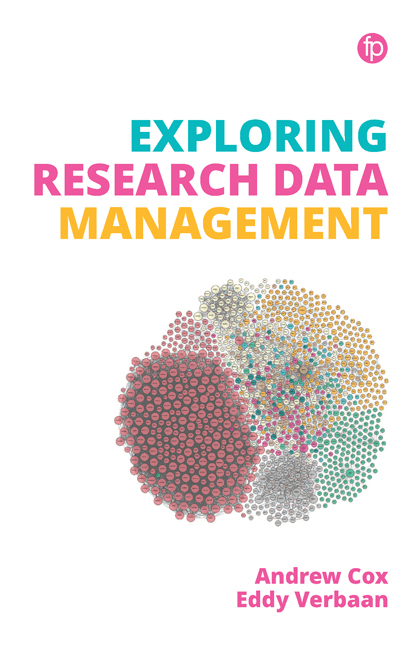Book contents
- Frontmatter
- Contents
- List of tables and figures
- 1 Introducing Research Data Management
- 2 The Social Worlds of Research
- 3 What Are Research Data?
- 4 Case Study of RDM in an Environmental Engineering Science Project
- 5 RDM: Drivers and Barriers
- 6 RDM as a Wicked Challenge
- 7 Research Data Services
- 8 Staffing a Research Data Service
- 9 Requirements Gathering for a Research Data Service
- 10 Institutional Policy and the Business Case for Research Data Services
- 11 Support and Advice for RDM
- 12 Practical Data Management
- 13 Data Management Planning
- 14 Advocacy for Data Management and Sharing
- 15 Training Researchers and Data Literacy
- 16 Infrastructure for Research Data Storage and Preservation
- 17 Evaluation of RDS
- 18 Ethics and Research Data Services
- 19 A Day in the Life Working in an RDS
- 20 Conclusion: the Skills and Mindset to Succeed in RDM
- Index
15 - Training Researchers and Data Literacy
Published online by Cambridge University Press: 21 September 2019
- Frontmatter
- Contents
- List of tables and figures
- 1 Introducing Research Data Management
- 2 The Social Worlds of Research
- 3 What Are Research Data?
- 4 Case Study of RDM in an Environmental Engineering Science Project
- 5 RDM: Drivers and Barriers
- 6 RDM as a Wicked Challenge
- 7 Research Data Services
- 8 Staffing a Research Data Service
- 9 Requirements Gathering for a Research Data Service
- 10 Institutional Policy and the Business Case for Research Data Services
- 11 Support and Advice for RDM
- 12 Practical Data Management
- 13 Data Management Planning
- 14 Advocacy for Data Management and Sharing
- 15 Training Researchers and Data Literacy
- 16 Infrastructure for Research Data Storage and Preservation
- 17 Evaluation of RDS
- 18 Ethics and Research Data Services
- 19 A Day in the Life Working in an RDS
- 20 Conclusion: the Skills and Mindset to Succeed in RDM
- Index
Summary
Aims
The aim of this chapter is to work through the decisions that need to be made to set up a programme of training about research data management.
Introduction
Central to any RDS will be the function of training members of the organisation in RDM. The chapter is organised around a series of interrelated decisions involved in designing such a training programme.
One of the outcomes of your talking to researchers and your more systematic user requirements gathering (Chapter 9) will be to have a feel for what the needs are around the institution. But determining audiences, content and channels for training is in itself quite challenging.
Exploring further
Think about some of the more engaging CPD or training courses you have been on. What made the best events stand out? It could be:
• the immediate usefulness of what you learned
• the hands-on time
• what you learned from other people on the course, as opposed to the trainers
• the time you were given to talk through how the challenge affected you
• the warmth and helpfulness of the trainers
• something else.
Think about how you can manage the learning situation to recreate such a good learning experience for anyone who comes on one of your courses.
Step 1: Who is the training for?
At some level it may be that every researcher in the institution needs some training in basic awareness of institutional policy and guidelines and to draw attention to critical areas of risk. But attempting to develop training that feels relevant to everyone, in every discipline and level of experience, is challenging.
It is probable that people in different meta-disciplines will have widely differing views on what RDM is about. That does not mean that they should be taught separately but it will take extra effort to ensure that the material feels relevant to everyone. An obvious compromise is to organise training by meta-discipline (e.g. for humanities scholars separate from engineers). Training customised to each department or subject discipline may not be scalable.
Actually it could be argued that those with similar methodologies might be best brought together, regardless of their field.
- Type
- Chapter
- Information
- Exploring Research Data Management , pp. 139 - 146Publisher: FacetPrint publication year: 2018

